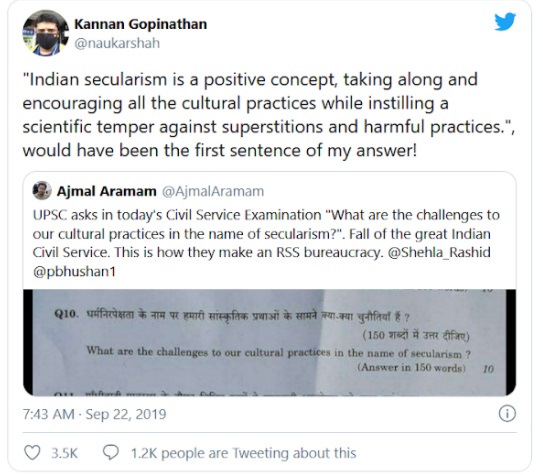(Getting Started) How To Handle Loaded/ Controversial Questions In UPSC Mains
(Getting Started) How To Handle Loaded/ Controversial Questions In UPSC Mains
UPSC conducts the Civil Services Examination to select the crème de la crème of candidates who will serve this country as bureaucrats over the next three to four decades. India is a democracy and governed by elected governments. However, the government changes every five years. It is the bureaucrats and the thousands of other employees that serve the government machinery that keeps this country moving forward. Bureaucrats also handle a lot of the execution of policies that directly affect the people of this country and thus, UPSC takes great care in ensuring they select people who will do not only a good job but a just job.
The Controversy Around “Loaded Questions”
UPSC has always maintained a standard by which they can filter out candidates and select those with the least political or social bias. Doing so ensures that no matter which government is in power, the bureaucracy never becomes a roadblock in their implementation of policies. In recent years, a trend is being noticed by which UPSC has started asking questions that seem to be prejudiced towards one direction or another, often leading an aspirant into the trap of taking an extreme position. As expected, this has drawn some flak.
What Is A “Loaded Question”?
In 2019, a question was asked that led to some uproar among aspirants and others alike. The question was “What are the challenges to our cultural practices in the name of secularism?” As one can tell, the question seems to assume that secularism is indeed contradictory to Indian culture and has negatively affected it. Aspirants, along with serving and former bureaucrats alike, were left wondering if UPSC is indeed taking a political stance. Questions like this, that make assumptions, whether true or false, and force aspirants to take the bait of taking an extreme stance are called “loaded questions”. Another such question asked in 2019 was “Do you agree with the view that steady GDP growth and low inflation have left the Indian economy in good shape? Give reasons in support of your arguments.”
How Should You Answer Loaded Questions?

First thing first – always know the reason why such a question was asked. It is because –
- UPSC wants to ensure that an aspirant is always rooted in facts and will not get carried away by fallacies.
- UPSC wants to ensure that every aspirant understands that their first duty is towards the Constitution of India.
Keeping this in mind, here are the top do’s and don’ts of answering loaded questions.
What Not To Do
- Do not find facts where there are none. For example, just because it says in the question that the GDP growth has been steady, you need not agree to it when you know that fact is that the growth has been faltering.
- Do not try to be diplomatic and neutral when a question calls for disagreement. The Constitution is sacred. So, there is no question of agreeing to a notion that goes against the very primal nature of our Constitution, irrespective of the tone of the question. Being diplomatic in this situation is disrespectful to the ethos on which our country was built.
What To Do
- Stand by your core values and answer like an upright officer. This isn’t a multiple-choice; you get to put your point forward. Agreeing or disagreeing isn’t the only option.
- Stand by facts and challenge assumptions made in the question. For example, if you know that the GDP is falling, mention those facts and figures before even attempting to answer the question. Talk about how the GDP calculation method change has affected the numbers. The examiner must realise that you know your facts.
- Compare the positives and negatives. In the secularism question, the framing seems to paint secularism in a negative light while holding Indian culture in a higher stature. However, you needn’t do that. Explain how the negatives of Indian culture such as casteism, the now abolished practices such as sati and child marriage, etc. must be weeded out. Explain how secularism, although often rejected as a western concept, helps India remain the melting pot of cultures, races, and religions, and is enshrined in our constitution.

Remember, as career bureaucrats there will be many contradictory, and in rare cases volatile, situations you will have to handle. Handling questions like this are meant to prepare you for that path, and that is UPSC’s true intention.
© IASEXAMPORTAL
CLICK HERE TO DOWNLOAD UPSC TOPPERS NOTES



